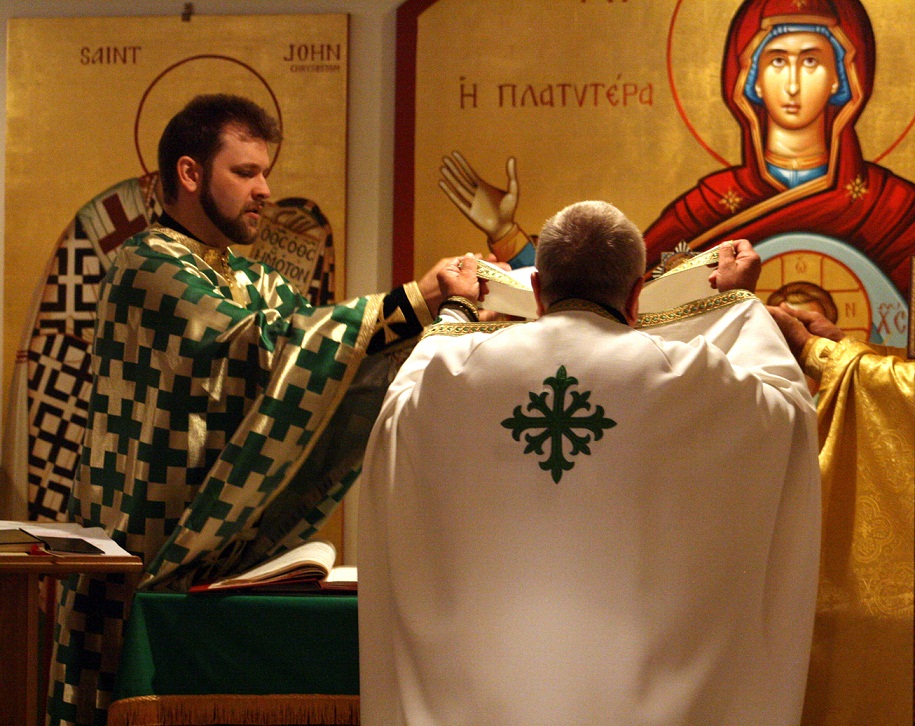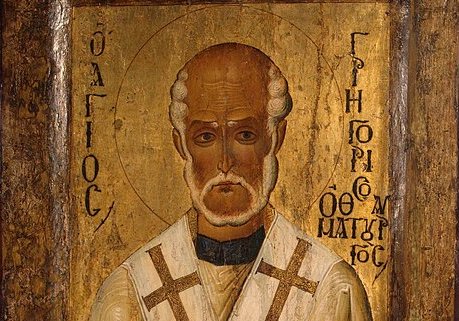
Sunday of the Publican and the Pharisee, February 5, 2012
Rev. Fr. Andrew Stephen Damick
In the Name of the Father and of the Son and of the Holy Spirit, one God. Amen.
This coming week is the week when we don’t fast.
This may well come as a surprise to some folks, as we Orthodox can be known—even among us Orthodox—as the Christians who fast, observe all kinds of feast days, practice complex piety, have head-spinning formulas for calculating Easter, use a vast array of odd and foreign-sounding titles for clergy, and so on. But this is the week when we don’t fast.
This probably comes as a bit of a shock, really. It would not be at all controversial to say that Orthodoxy is really the only kind of Christianity in our country that actually takes fasting seriously, such that nearly half the days on our calendar are fasting days. Certain other groups nod their heads to the idea of fasting or pay some lip service to it, and a few members within those groups might take it seriously, but Orthodoxy really is the only significant group of Christians in America who have a centuries-old tradition of giving up all animal products on a regular and consistent basis. But this is the week when we don’t fast.
In fact, the tradition of the Church is not that fasting becomes optional this week, but that it’s actually forbidden. Don’t fast.
What does this mean? Here we are, humming along normally, fasting on Wednesdays and Fridays, and Great Lent is about to start in just a few weeks, and then the Church says, “For the next week, don’t fast”?
Anyone who has ever tried to understand the Orthodox Christian faith in any sense more than the purely superficial has discovered that, once in a while, the Church throws a curve ball like this. There is something that somehow doesn’t fit the expected method. Why is this?
It is to make the point that doing everything “right” isn’t what makes you a Christian. And of course, fasting is one of those “right” things that we as Orthodox Christians do. Now, don’t get me wrong. The point of this fast-free week is certainly not to say that fasting is wrong. After all, Lent is, indeed, coming, and fasting is the first thing most of us think of when it comes to Lent (though of course we should first think of more worship!). And in the New Testament Jesus clearly expects those who follow Him to fast (Matt. 6:16-18, 9:15, 17:21, etc.). Fasting is an excellent tool. But we’re keeping that tool in the toolbox this week.
The point of our not fasting this week is the point that is being made by this Gospel we hear today, the Gospel of the Publican and Pharisee. The Pharisees, of course, are the “model” Jews of their day. They’re so serious about piety that they actually take the time to tithe from the spices in their cupboard. The Pharisee do everything right. And today’s Pharisee knows it. He thanks God for it.
But the Publican, this tax collector, does everything wrong. He is hated by those around him. He steals from them. He collaborates with the Romans. He is a traitor to his people. But he is the one whom Jesus says goes home “justified,” a word that means “righteous.” He is the one who goes home having been changed by God into a truly righteous person. The Pharisee doesn’t get that.
Now, I know that some of you hear this and think, “What do publicans and pharisees have to do with me? Why should I want to be ‘justified’ or ‘righteous’?” And some of you may be thinking, “What does this have to do with the New York Giants and the New England Patriots?” I’ll let you work that one out, but if you’re wondering what publicans and pharisees have to do with you, there is an answer.
The most basic question that someone either inside or outside a church should ask himself when considering his involvement in the Church is, “Why should I be here?” That’s an excellent question, and we all probably need to ask it of ourselves more often. This question goes to the heart of what the parable of the Publican and Pharisee is all about.
You are probably well aware that there are people who are involved in the life of various churches who, just like the Pharisee, do everything “right.” But somehow, when you deal with them personally, they don’t really remind you of the One Whom they say they’re worshiping. They’re not like Jesus. So if you ask them why they’re in church, they may well say something about wanting to get to Heaven, but deep down, their hearts just aren’t in it. In fact, they may be downright mean. They may always try to get their way. They may try to control things. They may expect to be praised publicly. They may even just be here for show.
But then, there are the Publicans—people who are probably not admired, probably not the “star” church member, probably not the first person people mention when they think of a fine, upstanding member of the community. And yet, they are like Jesus. Their hearts are soft. They don’t constantly have something to complain about, but are grateful for what they have. They aren’t always looking for something to gossip about, but are ready to say good things about others. They don’t really want to be in charge of anything, but they’re ready to serve (or even not serve) in whatever way they’re asked.
So you have to ask yourself which one you are. You have to ask yourself why you’re here. If you’re here because you’re expected to be here, then you’re being the Pharisee. If you’re here because you want to be here, you’re being the Publican. If you focus on doing what’s expected, but no more, you’re the Pharisee. If you focus on doing as much as you can and always looking for ways to do more, you’re the Publican. If you will only serve the way you want to serve, you’re the Pharisee. If you’re ready to serve in whatever way is needed and asked of you, you’re the Publican.
What’s the difference between these two men? The Pharisee is full of pride. He wants to do things only his own way. But the Publican is humble. He’s ready to do whatever it takes, even if it’s not comfortable, even if it’s embarrassing, even if it means admitting to everyone that he’s a sinner.
Deep down, the reason we all come to church—both the Publicans and the Pharisees—is because we want forgiveness for our sins. But the Pharisees don’t think they have any sins, not any they’re really ready to deal with, so while they may ask for forgiveness, while they may say “No, I’m not perfect,” they just think of forgiveness as a sort of ticket to Heaven, a kind of insurance policy. But because their hearts are not really in it, they’re not ready to receive what God is trying to give them.
The Publicans, on the other hand, don’t just say, “I’m not perfect.” They really know it. They really confess it. They bring it to their confessor and want to deal with it. Of course they’re humble, because they know they don’t deserve to be here, to be in the presence of the holy and perfect God. And because they’re humble, they’re ready to receive what God is ready to give them.
This Gospel has everything to do with you. It aims at the very center of why you’re here. Ask yourself today whether your heart is really here, whether you’re really giving your heart to God. Really. Ask yourself that right now.
Now, if you instantly answered yourself, “Yes, of course!” then I would like to suggest to you that you may be here as a Pharisee. Why? Because you took the question as an accusation. And when you hear something as an accusation, you’re hearing it with pride. You’re not ready to be taught. You don’t actually see yourself as the “chief of sinners” (I Tim. 1:15).
But if you answered yourself with, “You know, I’m not really sure” or “I don’t think I’m really giving my heart to God,” then you’re here as the Publican. You’ve seen at least a little of your heart, and you know that, even if you have given some to God, there’s still a lot more to go.
Whichever you may be—and you may be one today and the other tomorrow—know this: Christ our true God loves you just as you are. He loves you and is ready to forgive you. He is ready to welcome you into His house here in this earthly life and into the great Temple of Heaven in the next. It doesn’t matter who you are. It doesn’t matter what you’ve done. It doesn’t matter what you look like, what your name is, where you were born, how much money you have, and certainly not whether you know how to do all the “religious” stuff “right.”
So how do you receive this great gift? Give your heart. It’s the only way. The gift of God’s forgiveness really is free, but it can’t be received if you keep your heart to yourself. You have to give it. If you’re serious with yourself, you’ll know when you’ve done that. And I promise you’ll never regret it.
To God therefore be all glory, honor and worship, to the Father and to the Son and to the Holy Spirit, now and ever, and unto ages of ages. Amen.



